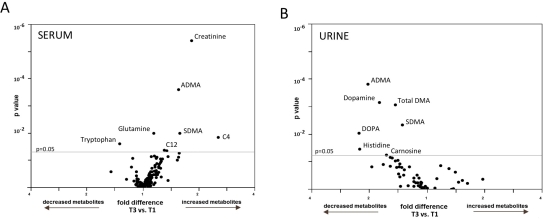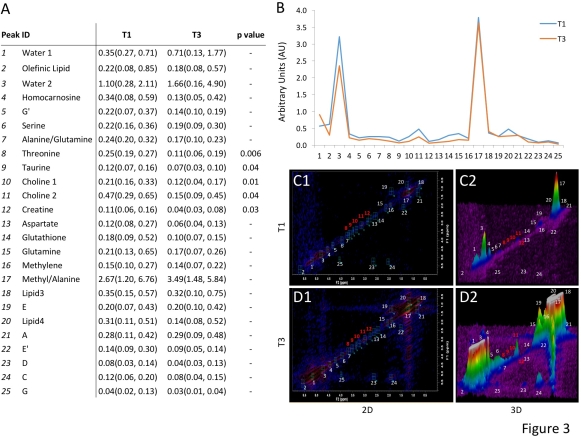Metabolomic Profiling of Individuals with Failing Kidney Allograft.
1Nephrology, Boston Children's Hospital, Boston
2Transplant Medicine, IRCCS San Raffaele Hospital, Milan, Italy
3Genetics and Epidemiology, Joslin Diabetes Center, Boston
4Radiology, Brigham and Women's Hospital, Boston
5Nephrology and Transplantation, San Giovanni Battista Hospital, Turin, Italy
6Transplantation Research Center, Brigham and Women's Hospital, Boston.
Meeting: 2016 American Transplant Congress
Abstract number: A229
Keywords: Glomerular filtration rate (GFR), NMR spectroscopy, Renal dysfunction
Session Information
Session Name: Poster Session A: Long Term Outcomes in Kidney Transplantation
Session Type: Poster Session
Date: Saturday, June 11, 2016
Session Time: 5:30pm-7:30pm
 Presentation Time: 5:30pm-7:30pm
Presentation Time: 5:30pm-7:30pm
Location: Halls C&D
Alteration of certain metabolites may play a role in the pathophysiology of renal allograft disease. To explore metabolome abnormalities in individuals with a failing kidney allograft, we analyzed by liquid/gas cromatography-mass spectrometry (LC/GS-MS; for ex vivo profiling of serum and urine) and three dimensional nuclear magnetic resonance spectroscopy (3D NMR; for in vivo study of the kidney graft), 40 subjects with varying degrees of chronic allograft dysfunction stratified by tertiles of glomerular filtration rate (GFR; T1, T2, T3). Ten healthy individuals were chosen as controls. LC/GS-MS analysis revealed a dose-response associationbetween GFR and serum concentration of tryptophan, glutamine, dimethylarginine isomers (asymmetric [A]DMA and symmetric [S]DMA) and short-chain acylcarnitines (C4 and C12), (test for trend: T1-T3=p<0.05; p=0.01; p<0.001; p=0.01; p=0.01; p<0.05, respectively). The same association was found between GFR and urinary levels of histidine, DOPA, dopamine, carnosine, DMA, SDMA and ADMA (test for trend: T1-T3=p<0.05; p<0.01; p=0.001; p<0.05; p=0.001; p<0.001; p<0.01, respectively)  . In vivo 3D NMR of the kidney allograft revealed significant reduction of the parenchymal content of choline, creatine, taurine and threonine (all: p<0.05) in individuals with lower GFR levels
. In vivo 3D NMR of the kidney allograft revealed significant reduction of the parenchymal content of choline, creatine, taurine and threonine (all: p<0.05) in individuals with lower GFR levels  We report an association between GFR and altered metabolic profile in renal transplant individuals with different degrees of kidney graft function.
We report an association between GFR and altered metabolic profile in renal transplant individuals with different degrees of kidney graft function.
CITATION INFORMATION: Bassi R, Niewczas M, Biancone L, Bussolino S, Lin A, Chandraker A, Fiorina P. Metabolomic Profiling of Individuals with Failing Kidney Allograft. Am J Transplant. 2016;16 (suppl 3).
To cite this abstract in AMA style:
Bassi R, Niewczas M, Biancone L, Bussolino S, Lin A, Chandraker A, Fiorina P. Metabolomic Profiling of Individuals with Failing Kidney Allograft. [abstract]. Am J Transplant. 2016; 16 (suppl 3). https://atcmeetingabstracts.com/abstract/metabolomic-profiling-of-individuals-with-failing-kidney-allograft/. Accessed February 16, 2026.« Back to 2016 American Transplant Congress
